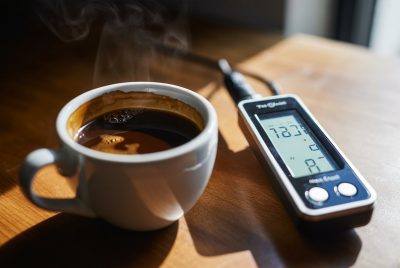Does Coffee Cause Bloating?
*We may earn a commission for purchases made using our links. Please see our disclosure to learn more.
That satisfying morning coffee ritual can sometimes come with an unwelcome companion: uncomfortable stomach bloating. For millions of coffee drinkers worldwide, this daily dilemma raises an important question about whether their favorite beverage is behind their digestive discomfort.
Coffee can cause bloating in many people, though the severity varies significantly based on individual tolerance, coffee type, brewing method, and what gets added to the cup. The caffeine, natural acids, and various compounds in coffee all interact with the digestive system in ways that may trigger gas, abdominal distension, and that uncomfortable feeling of fullness. However, understanding the mechanisms behind coffee-related bloating opens the door to practical solutions that allow most people to continue enjoying their coffee without the unwanted side effects.
“Coffee’s impact on digestion varies tremendously between individuals, influenced by factors from gut bacteria composition to stress levels. What causes severe bloating in one person may have no effect on another, which is why personalized approaches to coffee consumption are essential.”
— Journal of Gastroenterology Research
Key Takeaways
- Coffee stimulates stomach acid production, which can lead to bloating in sensitive individuals
- Caffeine accelerates gut motility, potentially causing gas and digestive discomfort
- The acidity level of coffee plays a significant role in bloating symptoms
- Adding dairy, sweeteners, or drinking coffee on an empty stomach can worsen bloating
- Choosing low-acid coffee, adjusting brewing methods, and timing consumption can minimize bloating
- Individual tolerance varies greatly based on gut health and coffee preparation methods
The Science Behind Coffee and Bloating
Coffee is a complex beverage containing over 1,000 chemical compounds, and several of these can affect your digestive system in ways that lead to bloating. Understanding which components trigger your symptoms is the first step toward finding solutions.
Caffeine’s Impact on Digestion
Caffeine acts as a stimulant throughout your body, including your gastrointestinal tract. It increases the production of stomach acid, which helps break down food but can also irritate the stomach lining in some people. This irritation may slow digestion, allowing food to ferment in your gut and produce excess gas.
Additionally, caffeine accelerates peristalsis—the wave-like muscle contractions that move food through your intestines. While this might seem beneficial, when things move too quickly, your body may not fully digest certain compounds, leading to fermentation and gas production in your colon.
The Acidity Factor
Coffee is naturally acidic, with a pH level ranging from 4.85 to 5.10. This acidity can trigger several bloating mechanisms. First, it may relax the lower esophageal sphincter, allowing stomach contents to back up and causing that uncomfortable full feeling. Second, excess acid production can slow gastric emptying, meaning food sits in your stomach longer, increasing the likelihood of bloating.
For those with sensitive stomachs or conditions like acid reflux or gastritis, this acidity becomes even more problematic, directly contributing to inflammation and gas buildup.
Coffee Compounds That Cause Gas
Beyond caffeine and acidity, coffee contains chlorogenic acids and other polyphenols. While these compounds offer antioxidant benefits, they can also stimulate acid secretion and increase gut motility. Some people’s digestive systems struggle to process these compounds efficiently, resulting in fermentation and gas production.
The oils in coffee, particularly cafestol and kahweol found in unfiltered brews, can also slow digestion for some individuals, contributing to that heavy, bloated sensation.
Common Culprits: What You Add to Your Coffee
Often, it’s not the coffee itself but what you put in it that causes bloating. Recognizing these additions helps you make informed choices about your coffee preparation.
Dairy and Lactose Intolerance
Approximately 65% of the global population has some degree of lactose intolerance. When you add milk or cream to your coffee, the lactose may ferment in your gut, producing significant amounts of gas and causing bloating, cramping, and discomfort.
Even if you don’t have diagnosed lactose intolerance, the combination of coffee’s acidity with dairy proteins can create digestive challenges. Casein, the primary protein in milk, can be difficult to digest for some people, especially when consumed with acidic beverages.
Artificial Sweeteners and Sugar Alcohols
Those zero-calorie sweeteners in your coffee might be sabotaging your comfort. Sugar alcohols like sorbitol, xylitol, and erythritol are poorly absorbed by the small intestine. When they reach your colon, gut bacteria ferment them, producing gas as a byproduct.
Even small amounts can cause significant bloating in sensitive individuals. Artificial sweeteners like sucralose and aspartame may also alter gut bacteria composition, potentially leading to increased gas production and digestive discomfort over time.
Flavored Syrups and Additives
Commercial flavored syrups often contain high-fructose corn syrup, which can cause bloating in people with fructose malabsorption. They may also include various stabilizers, emulsifiers, and preservatives that some digestive systems find challenging to process.
The Timing and Method Matter
How and when you drink your coffee can be just as important as what’s in your cup.
Drinking Coffee on an Empty Stomach
Starting your day with coffee before eating anything solid is a common practice, but it may be contributing to your bloating. When coffee hits an empty stomach, it triggers maximum acid production with nothing to buffer it. This can irritate the stomach lining and slow digestion throughout the day.
The caffeine also causes a cortisol spike when consumed first thing in the morning, which can affect how your body processes food later, potentially leading to bloating and digestive discomfort.
Brewing Methods and Bloating
Different brewing methods produce coffee with varying acidity and compound concentrations. Espresso and traditional drip coffee tend to be more acidic than cold brew. The hot water extraction pulls more acidic compounds and oils from the beans.
Cold brew coffee, steeped in cold water for 12-24 hours, produces a smoother, less acidic beverage that many people with sensitive stomachs tolerate better. French press and percolator methods create coffee with more oils and sediment, which some find harder to digest.
Consumption Speed and Volume
Gulping down your coffee quickly introduces more air into your digestive system, contributing to bloating. Additionally, drinking large volumes of any liquid distends your stomach, creating that uncomfortable full feeling.
The temperature of your coffee matters too. Very hot beverages can irritate your stomach lining and may cause you to swallow more air as you try to cool each sip in your mouth.

Individual Factors That Influence Coffee Bloating
Your personal response to coffee depends on several individual factors that make your experience unique.
Gut Microbiome Composition
Your gut contains trillions of bacteria that play crucial roles in digestion. The specific composition of your gut microbiome influences how you process coffee compounds. Some bacterial populations ferment coffee components more readily, producing excess gas.
Recent research suggests that regular coffee drinkers may develop gut bacteria that more efficiently process coffee compounds, which could explain why some people gradually build tolerance while others remain sensitive.
Underlying Digestive Conditions
If you have irritable bowel syndrome (IBS), inflammatory bowel disease (IBD), gastritis, or acid reflux, you’re more likely to experience coffee-related bloating. These conditions make your digestive system more sensitive to coffee’s stimulating and acidic properties.
Small intestinal bacterial overgrowth (SIBO) can also make coffee bloating worse. When excessive bacteria colonize your small intestine, they ferment coffee compounds quickly, producing significant gas and bloating.
Hormonal Fluctuations
Many women notice that coffee causes more bloating during certain phases of their menstrual cycle. Hormonal changes affect gut motility, fluid retention, and digestive sensitivity, making you more prone to coffee-related bloating during specific times of the month.
Practical Solutions to Enjoy Coffee Without Bloating
You don’t necessarily have to give up coffee entirely. These strategies can help minimize or eliminate bloating while preserving your coffee ritual.
Choose Low-Acid Coffee Options
Switch to coffee brands specifically processed to reduce acidity. Dark roasts naturally contain less acid than light roasts because the longer roasting process breaks down more acidic compounds. Look for coffee labeled as “stomach-friendly” or “low-acid.”
Cold brew preparation significantly reduces acidity—by up to 70% compared to hot-brewed coffee. If you prefer hot coffee, try the cold brew concentrate and heat it gently rather than brewing with hot water from the start.
Adjust Your Coffee Preparation
Use a paper filter when brewing, which removes many of the oils that can contribute to digestive discomfort. Avoid French press and percolator methods if you’re particularly sensitive.
Let your coffee cool to a comfortable temperature before drinking. This prevents stomach irritation and reduces the amount of air you swallow while drinking.
Modify What You Add
Experiment with plant-based milk alternatives like almond, oat, or coconut milk. Many people find these easier to digest than dairy. If you must use dairy, try lactose-free milk or add a lactose enzyme supplement.
Replace artificial sweeteners with small amounts of natural sweeteners like honey or maple syrup, or gradually reduce sweetness altogether. Your taste buds will adapt, and you may discover you enjoy the natural coffee flavors more.
Time Your Coffee Consumption Strategically
Wait at least 30-60 minutes after waking before having your first coffee, allowing your natural cortisol levels to peak naturally. More importantly, eat something before your coffee—even a small snack can buffer the acidity and reduce bloating.
Stop drinking coffee at least 4-6 hours before bedtime. Late-day caffeine can disrupt sleep, and poor sleep quality is associated with increased digestive sensitivity and bloating the next day.
Control Portion Size and Consumption Rate
Limit yourself to one or two small cups rather than consuming large amounts throughout the day. Sip slowly and mindfully, putting your cup down between sips. This reduces air swallowing and gives your digestive system time to process the coffee.
Consider diluting your coffee with hot water (Americano-style) to reduce the concentration of compounds that trigger bloating while still enjoying the flavor and ritual.
Alternative Approaches for Coffee Lovers
If traditional solutions aren’t enough, these alternatives might work better for your system.
Mushroom and Chicory Coffee Alternatives
Coffee alternatives made from mushrooms, chicory root, or roasted grains offer similar rich, roasted flavors without the acidity and caffeine that trigger bloating. Many find these surprisingly satisfying substitutes.
Some products blend these alternatives with small amounts of coffee, giving you some of the coffee experience with reduced side effects.
Decaffeinated Coffee
Since caffeine is a major bloating trigger, switching to high-quality decaf might solve your problem. Modern decaffeination processes preserve most of the flavor while removing 97% or more of the caffeine.
Be aware that decaf coffee still contains some caffeine and remains acidic, so it may not eliminate bloating entirely, but many people find it significantly easier on their digestive system.
Strategic Supplementation
Taking a probiotic supplement regularly can help balance your gut microbiome, potentially improving your tolerance to coffee over time. Look for strains specifically researched for digestive health, like Lactobacillus and Bifidobacterium species.
Digestive enzymes taken before coffee can help break down the compounds that cause bloating. Some people find that a magnesium supplement helps regulate gut motility and reduces coffee-related digestive issues.
Listening to Your Body’s Signals
Your body provides valuable feedback about how coffee affects your digestion. Learning to read these signals empowers you to make choices that support your wellbeing.
Keeping a Coffee and Symptom Journal
Track when you drink coffee, what you add to it, and how you feel in the hours afterward. Note the brewing method, time of day, whether you ate first, and the severity of any bloating. Patterns will emerge that help you identify your specific triggers.
This information becomes invaluable for making adjustments. You might discover that coffee at breakfast causes no issues, but coffee as an afternoon pick-me-up always leads to bloating.
Recognizing When to Take a Break
Sometimes your digestive system needs a reset. If bloating persists despite trying various modifications, consider a two-week coffee break. This allows your stomach lining to heal and your gut bacteria to rebalance.
When you reintroduce coffee, start with small amounts of the least problematic preparation method you identified. You may find your tolerance has improved, or you may decide that life without bloating is worth adjusting your coffee habits permanently.
The Bigger Picture of Digestive Health
Coffee-related bloating often signals broader digestive health issues worth addressing. If you’re experiencing bloating from coffee, you might also be reacting to other foods, dealing with chronic stress affecting your gut, or managing an underlying digestive condition that needs attention.
Consider working with a healthcare provider or registered dietitian who can help you identify root causes rather than just managing symptoms. Improving your overall gut health often means you can eventually tolerate coffee better—or you may discover that eliminating it was the key to feeling your best.
Moving Forward with Confidence
The journey to understanding your relationship with coffee and bloating is deeply personal. There’s no one-size-fits-all solution because each person’s digestive system, gut microbiome, and lifestyle are unique.
Start with the modifications that seem most relevant to your situation. Perhaps it’s switching to cold brew, eliminating dairy, or simply eating before your morning cup. Give each change at least a week before evaluating its effectiveness, as your digestive system needs time to adjust.
Remember that enjoying your coffee should enhance your life, not cause discomfort. If coffee consistently triggers bloating despite your best efforts to modify your habits, it’s perfectly acceptable to reduce your consumption or explore alternatives. Your digestive comfort and overall wellbeing matter more than any beverage ritual.
The good news is that with awareness, experimentation, and patience, most people can find a way to enjoy coffee that works for their unique digestive system. Whether that means switching to cold brew, timing your consumption differently, or discovering that one small cup is your sweet spot, you have the power to make choices that honor both your love of coffee and your body’s needs.
Conclusion
Coffee can indeed cause bloating, but it’s not inevitable. The bloating stems from multiple factors including caffeine’s stimulating effects, coffee’s natural acidity, compounds that trigger gas production, and often what you add to your cup. Individual factors like gut health, underlying digestive conditions, and even hormonal fluctuations influence how your body responds to coffee.
The encouraging reality is that you have numerous strategies available to minimize or eliminate coffee-related bloating. By choosing low-acid options, adjusting your brewing method, being mindful about additions like dairy and sweeteners, timing your consumption thoughtfully, and paying attention to your body’s signals, you can likely continue enjoying coffee without discomfort.
If bloating persists despite these modifications, it may signal that your digestive system needs additional support or that coffee simply isn’t compatible with your current health status. That’s valuable information that empowers you to make choices aligned with feeling your best.
Your relationship with coffee should bring pleasure, ritual, and perhaps a gentle energy boost—not digestive distress. With the knowledge and strategies you now have, you’re equipped to experiment, adjust, and discover what works for your unique body.
Frequently Asked Questions
Can I build tolerance to coffee and reduce bloating over time?
Yes, many people develop improved tolerance to coffee over time. Your gut microbiome can adapt to regular coffee consumption, developing bacterial populations that more efficiently process coffee compounds. However, this adaptation takes consistent exposure over weeks or months and doesn’t work for everyone. If you have underlying digestive conditions, you may not develop tolerance. Gradual reintroduction after a break, combined with gut-supporting practices like probiotic intake, can help build tolerance for some individuals.
Is decaf coffee less likely to cause bloating than regular coffee?
Decaf coffee may cause less bloating since it contains 97% less caffeine, one of the primary bloating triggers. However, decaf still contains all the acidic compounds and oils present in regular coffee, so it can still cause bloating in sensitive individuals. Many people find decaf easier on their stomach, but it’s not a guaranteed solution. The brewing method and what you add to decaf matter just as much as with regular coffee. Cold brew decaf might be your best option if you’re particularly sensitive.
Why does coffee cause bloating only sometimes and not consistently?
Several factors can make coffee’s effects inconsistent. Your digestive system’s sensitivity fluctuates based on stress levels, sleep quality, hormonal cycles, what else you’ve eaten, hydration status, and even the specific coffee beans and brewing method. Coffee might cause no issues when consumed with a substantial breakfast but trigger bloating on an empty stomach. Women often notice increased sensitivity during certain menstrual cycle phases. The variability in coffee beans, roasting, and preparation methods also means each cup affects you differently.
Does adding lemon to coffee help reduce bloating?
Adding lemon to coffee is popular in some wellness circles, with claims it reduces acidity and bloating. However, lemons are acidic (pH around 2), so adding lemon juice actually increases your coffee’s total acidity rather than neutralizing it. While some people report subjective improvements, there’s no scientific evidence that lemon reduces coffee-related bloating. The perceived benefit might come from the flavor making you sip more slowly or from the ritual aspect. If you enjoy it and feel better, continue, but don’t expect lemon to chemically neutralize coffee’s bloating effects.
Should I eliminate coffee completely if it causes bloating?
Complete elimination isn’t always necessary. First, try the various modifications discussed: switch to low-acid or cold brew coffee, eliminate dairy and artificial sweeteners, eat before drinking coffee, reduce portion size, and change your brewing method. Many people successfully eliminate bloating with these adjustments. However, if bloating persists despite trying multiple strategies, a temporary break of 2-4 weeks can help you assess whether coffee is the true culprit. If you feel significantly better without it, or if you have diagnosed digestive conditions that coffee aggravates, elimination might be your best option for optimal digestive health.




